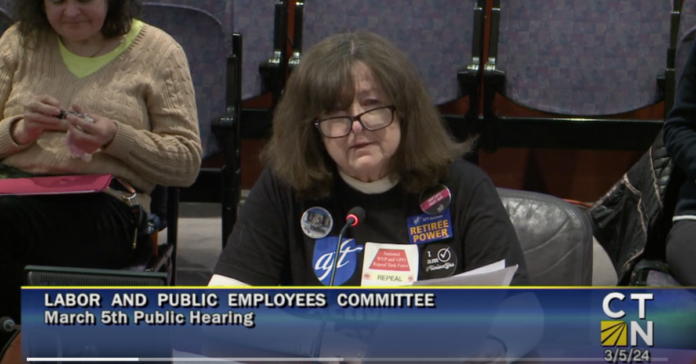Members of AFT Connecticut-affiliated local unions have refused to let up on fixing a federal system that has let down public school educators. Despite setbacks, they have steadfastly advocated for the U.S. Congress to repeal Social Security restrictions penalizing retired public employees in 15 states. Over the past year, their activism has helped revive national efforts targeting two unjust policies; the Windfall Elimination Provision (WEP) and the Government Pension Offset (GPO).
Click here for our previous report on members’ advocacy to reform Social Security for public education professionals.
A popular “repeal the steal” proposal in the U.S. House of Representatives stalled out in 2022, but labor activists across the country continued their grassroots lobbying. Those efforts bore fruit when the bill was reintroduced last year, followed by an inaugural public hearing held by the lower chamber’s budget and tax committee this past spring.
As the renewed Social Security Fairness Act (H.R. 82) regained steam, a companion proposal in the U.S. Senate (S. 597) was introduced and now counts nearly two-thirds of the upper chamber as cosponsors. In June, the chair of the Social Security and pensions subcommittee held a highly publicized field hearing on the legislation in their home state of Ohio.
Labor activists in Connecticut have contributed significantly to shifting the political winds in support of repeal both here at home and in the nation’s capital. Teaming up with their siblings in the Connecticut Education Association (CEA) and Association of Retired Teachers of Connecticut (ARTC), union members have boosted the signal call for long overdue reform.
Click here for press reporting on local activists’ advocacy aimed at moving federal elected officials to action.
The collaboration helped move state lawmakers in the General Assembly’s labor committee to introduce a resolution earlier this year in support of repealing the WEP and GPO. While non-binding on members of Congress, the proposal helped further amplify growing demands for reform and focus additional attention on the proposed federal legislation.
“I think it is important that you do weigh in in favor of repeal,” retired geography and study skills teacher Mary Moninger-Elia (in screenshot, above) told state lawmakers in a March public hearing. “Here in Connecticut, 22,548 retirees are losing up to $587 a month due to WEP diminishing the Social Security benefits they earned for themselves. Almost 10,000 retirees lose spousal or survivor benefits earned for their protection by their husband or wife,” added Moninger-Elia, who served for 24 years as president of our West Haven Federation of Teachers.
While active and retired union members have spoken out here in Connecticut, our national union has helped coordinate efforts with allied labor and senior advocates across the country.
Click here to sign and share the repeal petition organized by the Strengthen Social Security coalition.
“While these provisions do not impact every retiree in every state, the people they do impact feel real economic pain,” AFT President Randi Weingarten told activists in a June email. “Both penalties disproportionately affect low-income retirees and the GPO targets women five times as often as men,” she added, making the solidarity case for all members to support repeal efforts.
Everyone deserves a secure retirement, especially those who devoted their career to public service. Both the WEP and GPO threaten that by reducing or eliminating the earned benefits of millions of educators and public employees who contributed to Social Security through other employment. Thousands more are penalized every year as they retire because their state, municipality or school district does not participate in the system.
With over 320 cosponsors of H.R. 82 in the House and more than 60 backing S. 597 in the Senate, federal elected officials have spoken on behalf of their constituents. It is time for leadership in both chambers to rectify these discriminatory policies and call each bill for up or down votes before the current Congress adjourns in January.
Click here to sign-up for federal advocacy alerts via email from our national union (check the “AFT e-Activist Network” box).



